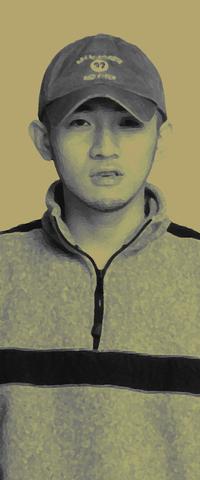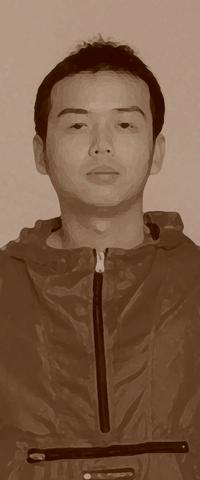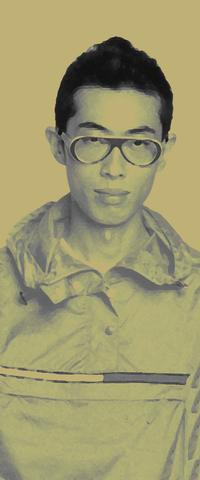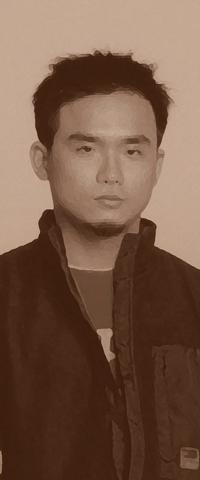After a hiatus of nearly three years, the Taipei band Sticky Rice (糯米糰) made a welcome return to the local music scene late last year with the band's second album Bird King (青春鳥王).
Packed with different styles ranging from electronica and funk to break beats, it was a far cry from the band's 1997 eponymous debut Sticky Rice (糯米糰), on which the band blasted its way through a collection of tunes packed with guitar-driven rough-and-ready musical mayhem.
Formed in the mid-1990s, Sticky Rice hit the local music scene at a time when the nation's now maturing indie scene was in its infancy. Led by lanky vocalist, Ma Nien-hsien (馬念先), who sported a mohawk hair-do and wore distinctive retro glasses, the band proved an instant hit, selling out many of the city's alternative music venues.

PHOTO: COURTESY OF MAGIC STONE
As the band built up a following among the indie crowd, Ma and his three bandmates -- Chen Chi-han (沉其翰) on guitar, Hung Chih-li (洪峙立) on drums and Yu Guang-yao (余光耀) on bass -- caught the attention of the movie industry. Director Chen Yu-hsun was so taken by the material on the album, that he invited them into the studio to record the soundtrack for his 1997 film Love A GoGo (愛情來了). The soundtrack was later nominated for Best Musical Score at the 1997 Golden Horse Awards.
Just as the band looked set to become one of only a handful of local acts to rise from garage band status to pop stars their country called. The lads were shipped to boot camp to begin their military service, where they remained until early last year.
The band may have been dormant while Ma, Chen, Hong and Yu were doing push-ups for the nation, but the local music industry didn't forget Sticky Rice. Shortly after being demobilized the band was back in the studio and recording a demo tape. Magic Stone signed them soon after.

PHOTO: COURTESY OF MAGIC STONE
"We sent demos to three labels and heard back from three of them pretty quickly, which was a real surprise," Ma said recently. "We were looking for a certain amount of freedom in the studio to record the music we wanted, rather than what the record label told us to."
Far from numbing the senses, military discipline appears to have paid dividends, as last year's Bird King attests. The album shows a tighter and musically more mature Sticky Rice. Thankfully, the military didn't take away the band's dead-pan sense of humor. The electronica/funk song Aluba Aliba, for example, tells of a game in which young boys compete to see who can run, jump and then slide across the ground and come to a halt closest to the trunk of a tree without damaging their manhood.
Any gig Sticky Rice headlines or even makes the briefest of appearances at is guaranteed to be a rowdy affair. The band doesn't offer stand-up comedy routines full of biting social commentary like their peers, Clippers (夾子電動大樂隊), but they have their own style of onstage nonsense. When the band kicks into a funk tune in the style of Sly and the Family Stone, the chances are the tune won't stay that way for long. The band will suddenly up the tempo and before audiences know what's happening an onslaught of electronica twists and guitars turns the tune into a thumping dance song that whips crowds into a frenzy.

PHOTO: COURTESY OF MAGIC STONE
While Sticky Rice cut its teeth on the fringe of the local alternative scene, the band remains adamant that they are not, and never have been, an "alternative" band. They are pop stars, they say, albeit rather eccentric ones.
"We started out playing venues such as Roxy Vibe and Underworld, and have played at several Spring Screams, but I wouldn't call us alternative. We never touched politics like LTK (濁水溪) or Clippers and we steered away from guitar rock like Quarterback (四分衛)," said Hong, the band's drummer. "If people have to label us, then I think that an off-the-wall pop band would be a much better tag."
Performance Notes:

PHOTO: COURTESY OF MAGIC STONE
What: Sticky rice Live (糯米糰)
When: Tomorrow 7pm.
Where: @Live Disco, 3F, 15 Hoping W. Rd., Sec. 1 (和平西路一段15號3F).
Tickets: NT$400 at the door.

US President Donald Trump may have hoped for an impromptu talk with his old friend Kim Jong-un during a recent trip to Asia, but analysts say the increasingly emboldened North Korean despot had few good reasons to join the photo-op. Trump sent repeated overtures to Kim during his barnstorming tour of Asia, saying he was “100 percent” open to a meeting and even bucking decades of US policy by conceding that North Korea was “sort of a nuclear power.” But Pyongyang kept mum on the invitation, instead firing off missiles and sending its foreign minister to Russia and Belarus, with whom it

When Taiwan was battered by storms this summer, the only crumb of comfort I could take was knowing that some advice I’d drafted several weeks earlier had been correct. Regarding the Southern Cross-Island Highway (南橫公路), a spectacular high-elevation route connecting Taiwan’s southwest with the country’s southeast, I’d written: “The precarious existence of this road cannot be overstated; those hoping to drive or ride all the way across should have a backup plan.” As this article was going to press, the middle section of the highway, between Meishankou (梅山口) in Kaohsiung and Siangyang (向陽) in Taitung County, was still closed to outsiders

Many people noticed the flood of pro-China propaganda across a number of venues in recent weeks that looks like a coordinated assault on US Taiwan policy. It does look like an effort intended to influence the US before the meeting between US President Donald Trump and Chinese dictator Xi Jinping (習近平) over the weekend. Jennifer Kavanagh’s piece in the New York Times in September appears to be the opening strike of the current campaign. She followed up last week in the Lowy Interpreter, blaming the US for causing the PRC to escalate in the Philippines and Taiwan, saying that as

The Chinese Communist Party (CCP) has a dystopian, radical and dangerous conception of itself. Few are aware of this very fundamental difference between how they view power and how the rest of the world does. Even those of us who have lived in China sometimes fall back into the trap of viewing it through the lens of the power relationships common throughout the rest of the world, instead of understanding the CCP as it conceives of itself. Broadly speaking, the concepts of the people, race, culture, civilization, nation, government and religion are separate, though often overlapping and intertwined. A government